The corners come up fast when you’re pushing 150 mph. But with little more than a whoosh, we blast around the high-banked oval at the Hyundai Namyang Proving Grounds, the big sedan firmly locked in its lane.
Though there aren’t many places where you can expect to clock those sorts of speeds in South Korea, Hyundai has reason to show off the high speed handling of its new Equus sedan, its first to go up against the best the Germans can offer, better-known nameplates like the Mercedes-Benz S-Class and BMW 7-Series.
It’s been two years since the Korean carmaker first entered the luxury market with its Genesis sedan. The offering took the market by surprise, winning the coveted North American Car of the Year trophy and building a reasonably solid market among buyers who sought a mid-range luxury sedan without the high-priced sticker of import offerings like the Audi A6 or Lexus GS.
But it’s another matter entirely to push into the premium luxury market, where buyers are far less forgiving of flaws and far more demanding when it comes to quality, refinement and features. So, how does the new Equus stack up?
Certainly, there are those who will think Hyundai is over-reaching with the sedan. There’s no question that the Korean carmaker has done a credible job improving its image with a steady string of solid offerings, but this is a rarified segment of the market where only the best can compete. But, then again, isn’t that what we said, two decades ago, when the Lexus LS first came to market?
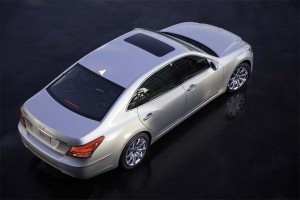
The overall dimensions of the new Hyundai Equus square directly with competitors like the S-Class and 7-Series.
From a design standpoint, Equus is a handsome car that says, “I’ve arrived,” precisely what you expect of a premium luxury car. If anything, it’s a bit derivative, with a front end that readily reminds you of the S-Class, and a rear profile that’s more Lexus-like. Hyundai has tried to deliver a few unique touches, but as with the subtle twists added to the very Mercedes-like grille, we’re hoping to see a more brand-distinctive look next generation – as Hyundai has delivered on models like the latest Sonata.
In terms of overall dimensions, the 203-inch length of the Equus is about 7 inches longer than the Hyundai Genesis, and smack in the middle when compared to the likes of the S-Class, A8, LS and 7-Series. At 74.5 inches, it’s one of the wider entries in the segment.
One surprise was the decision to eliminate the distinctive – some would say quirky – winged Equus badge offered in the Korean market and used on some Equus prototypes we’ve seen here in the U.S.
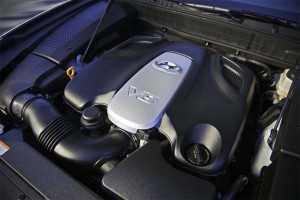
The 4.6-liter Tau V8 will be offered initially, but Hyundai will quickly migrate to a 5.0-liter DI version mated to an 8-speed automatic.
Hyundai plans to offer two versions of the sedan, the Equus Signature and Equus Ultimate. While conventional wisdom would suggest that buyers in this segment can afford to pay what it takes, the pragmatic reality is a bit different, especially these days, so a value-oriented offering should do well, much as the original Lexus LS did during the financially troubled late ‘80s.
Hyundai is sitting on the price until closer to the Equus launch, next year, but we’re comfortable in projecting a starting price in the low-$60,000 range for the Equus Signature, pushing well above $70,000 for a loaded Equus Ultimate. That will nonetheless come in many thousands below the German and Japanese rivals – even with standard features, like Active Cruise Control, that are optional for most competitors.
For the money expect well-equipped models with all the wood and leather you’d expect from a car of this class. The Signature will deliver a 608-watt 17-speaker audio system, electronically-controlled air suspension, parking assistance with rearview camera, heated and cooled seats and a heated steering wheel. Ultimate will add some nice backseat features, included cooled rear seats that recline and offer electric, business class-style legrests. There’s also a thermoelectric refrigerator in the center console, a forward-view cornering camera and power rear decklid.
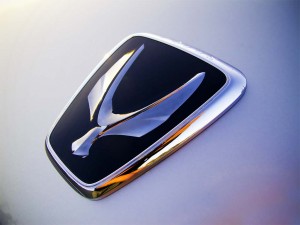
The winged hood ornament will be replaced by a more modest badge, but Hyundai officials suspect some dealers will import the hood ornament, anyway.
In terms of safety features, Equus leaves little lacking, with ABS, traction control, stability controls, active cruise, collision warning and plenty of airbags, including driver’s knee bag. But it doesn’t have quite as many of the latest bells-and-whistle systems, such as cross-traffic alert, found in the 7-Series.
The sedan we drove featured the well-regarded 385-horsepower Tau V8. It’s a reasonably competitive powertrain, mated to the current Hyundai 6-speed Shiftronic gearbox. Launch feel was solid and aggressive under wide-open throttle. The engine is reasonably quiet until you floor the throttle, when it releases a reassuring roar.
The good news is that Hyundai has an even better engine in store, a 5.0-liter direct-injection version of the Tau that officials confirmed will be coming to Equus less than half a year after launch (and also to the Genesis). This V8 truly makes a competitive statement, putting out a neck-snapping 429-horsepower and 376 pound-feet of torque. The dual CVVT engine will be mated to a new 8-speed gearbox.
We’ll have a more extensive review of the Equus before the end of summer, but our all-too-brief first drive was a generally impressive one. The air suspension delivers a smooth, comfortable ride, one a bit more Mercedes-like, rather than the firm, aggressive manners of the 7-Series. The cabin is nearly as quiet as a Lexus LS, meanwhile.
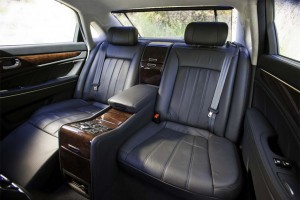
There will be two versions of the Equus, the Ultimate offering business class seating, including electrically-operated footrests.
There are subtle details that give the Hyundai Equus a wee bit more of a mass market feel than some of its competitors, though the overall look and feel of the interior is also quite impressive, especially for the money.
Then again, there are some things that Hyundai will add to the package that today are offered by only the most exclusive of luxury brands, such as Bentley or Rolls-Royce. That includes a Valet Service pick-up-and-delivery, and the ability to shop at your home or office, rather than having to go to a dealership. The traditional print service manual, meanwhile, will be supplemented with an Apple iPad that will even permit online service scheduling.
We’re looking forward to getting some serious time behind the wheel of the new Hyundai Equus, but if our initial experience is any indication, the Korean maker won’t be an also-ran. It has a product that could readily elbow its way into a tough crowd.

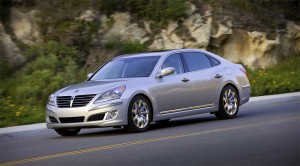
My business associates in Seoul drive Equus and the President and the Chairmen. They are all very fine vehicles in every respect.
If I had $60,000 to spend on a car, any car, it sure wouldn’t be a Hyundai–even with the improvements they’ve made of late. IMHO, until they do something original, or even remotely “out of the box,” their copy-cat type of styling will be an also-ran in the luxury segment–sure they’ll sell a few, but who cares.
I hope the article is wrong with the projected price… last I heard, the Signature was 55k and the Ultimate was 60k… I plan on getting one but may wait for the bigger engine to come out… I don’t know what Samantha is talking about with “out of the box”… BMW, Audi, and Lexus didn’t do anything “out of the box” when they presented their luxury models… 55k compared to a 120k Mercedes with the same features is pretty “out of the box” in itself…